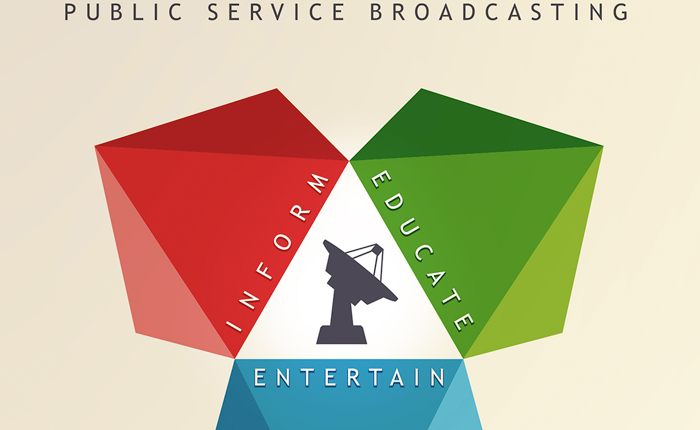Public Service Broadcasting
BY GEORGE TOWNSEND
TUESDAY, 8TH OCTOBER 2013
"No use, is it? I tell you, things have never been as bad as this. Have you seen the headlines?"

It would be easy to accuse Public Service Broadcasting of simply pandering to popular nostalgia. Much of the enjoyment of watching classic old British films like A Matter of Life and Death, listening to tapes of old radio programs like The Goon Show, even just going to see The King's Speech, in the cinema, surely comes from the love that many have for the way British people used to speak, and all that that represents. And it's undeniable that, on their debut album, PSB have taken full advantage of this popular love affair with the voices of the past. On Inform - Educate - Entertain, the music underpins not lyrics and sung melodies, but the crisp and dulcet spoken word of old BBC radio broadcasts, archive footage, and wartime propaganda.
Arguably, the music isn't the most original thing you'll hear this year. It ranges from experimental electro-rock, with the propulsive rhythmic drive (though perhaps not quite the psychedelia) of Holy Fuck, to the emotive though rather more M.O.R. vibes of Editors, to something with a drop more menace to it, particularly in the Queens-of-the-Stoneage-esque 'Signal 30', during which the samples seem almost to be reprimanding the music for its thrill-seeking: "…you're driving a little too fast and have a false sense of confidence".
But here is where PSB become much more than the lesser-known relative of their sonic cousins. The interaction between the music and the samples is seriously engrossing, allowing the record to blast through the 'glazing over' effect that the culture of the past often has on younger generations. There's a child-like imagination to it, as the music breaths new life into the overfamiliar. It's certainly not an album for cynics. 'ROYGBIV' gets you reveling in the wonders of colour television, as if for the first time: "colour within the reach of everyone…the tube with the heart of a rainbow". The build-up of 'Night Mail' evokes images of countless trains rushing through the darkness as "half a million letters are sorted and dropped during the night". The more ethereal 'Lit Up' reminds me of the playful atmospherics of groups like Plone and Emeralds, suggesting a myriad of blinking headlights sweeping along the arc of a motorway.
However, as the quote I began with (taken from 'Late Night Final') suggests, this record is more than just a straightforward celebration of the past. It's about our relationship with the world being mediated, a process that can lead as much to doom-mongering and paranoia, as to imaginative escapism. Even 'Everest' - perhaps the record's most exhilarating moment - is tempered with a sense of danger, within the track itself ("…you're moving in a dream, a dream that deludes and debilitates"), but also within the context of the album as a whole; the synths and horns of 'Qomolangma' have a wistful beauty to them, reminiscent of Sigur Rós, but the track's title, which refers to the old Tibetan name for Mount Everest (pre-dating the name Everest by at least a few hundred years) throws the samples overlaid onto 'Everest' into question. Suddenly there's a whiff of Western colonialism to the track's dramatic opening lines: "Once there was a mountain called Peak 15. Nothing was known about it, but in 1852 the surveyors found it was the highest in the world, and they named it 'Everest'."
On one level, this simple, yet touching and intelligent record invites you to take a dip in the popular dreams of the past; on another, and with further listening, there grows an awareness that that these dreams are just that - dreams, smitten with the notion of an undiscovered world beyond the everyday. But this doesn't make the music-sample interplay any less fun, or any less poignant. Rather, it makes you take a more sensitive look at the view of the world being resuscitated, and perhaps even gets you thinking about how our world is mediated today.
By George Townsend
Video for 'Everest'.